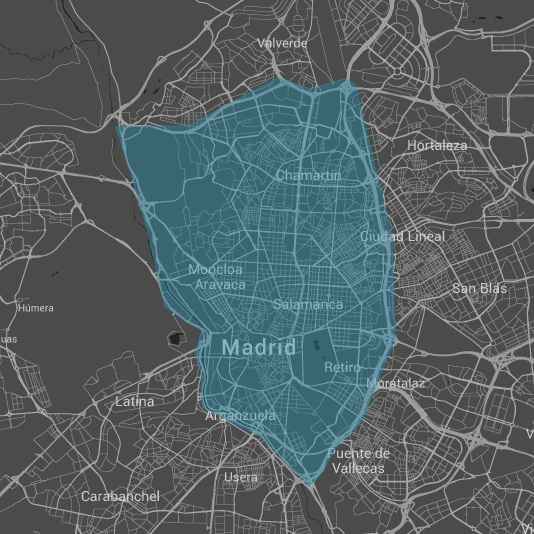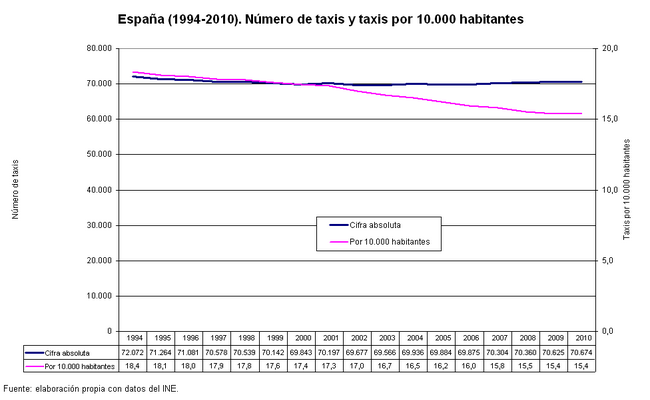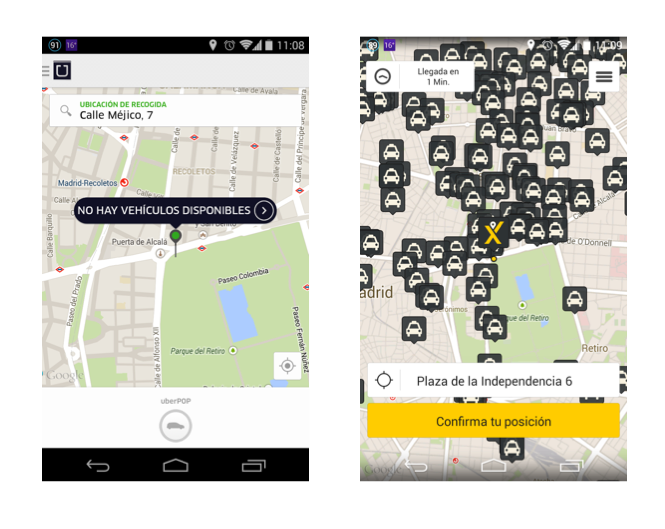Unless you’ve been hiding under a rock for the past 24 hours you’ve probably heard that UberPOP is now available in Madrid. The service allows anyone -who has gone through background checks- with a car to become a taxi driver, charging lower rates than traditional taxis while Uber keeps a 20% commission.
UberPOP has been available in Barcelona for several months and taxis have complained vastly about the service. Why? For two main reasons: because the taxi industry has been overprotected for decades by governments and local entities and because UberPOP, according to Spanish legislation, is currently illegal. The law forbids private individuals from offering transportation services for profit, and this is exactly what Uber’s service does.
Unless, of course, you believe what Uber has been telling Spanish media. Uber claims that drivers are not making any money and that they are simply “covering the costs” associated with the maintenance of their cars and rides. Something that conflicts with what various UberPOP drivers have told me. I’ve used the service a handful of times in Barcelona and drivers seem pretty happy with it, given that it allows them “to make some money” now that they don’t have a job, work fewer hours, etc.
It’s a totally different scenario from Blablacar, which also claims that passengers’ money helps cover costs associated with the transportation. And it’s different because it makes sense to fill up empty seats if you’re going to be traveling for various hours, but when you’re driving around town for 4 to 5 hours the scenario changes dramatically. You don’t do that to “cover costs”, but to make money. And Uber knows this too.
The situation in Spain: Fewer taxis per capita, fewer consumers
The total number of taxis in Spain has remained somewhat stable over the past two decades. In 1994 there were 72,071 taxis in the country, compared to 70,623 in 2012. Only in Madrid there are more than 15,000 active taxi licenses.
However, population in Spain has increased significantly in that time. According to various studies the number of taxis per 1,000 residents has decreased significantly since 1994. And taxi drivers themselves have previously claimed that there are too many taxis in cities like Barcelona and Madrid, which should push prices down for customers. This is hard to prove, given the lack of analysis of the evolution of taxi prices in Spain.
However, we do know that there are many more taxis per 1,000 residents in Spain than in other European capitals. And it’s also true that the economic crisis has affected public transportation negatively: the number of Spaniards using the tube and buses has decreased by 15,8% and it only makes sense that the same has happened to taxis.
This could imply two things: that taxi prices should have decreased lately or that consumers are waiting for cheaper alternatives to emerge. Enter UberPOP.
Is UberPOP (or Uber) the solution to Europe’s taxi problems?
Uber is an American company and it adapts perfectly to the way American cities are built. Transportation in the US sucks except in a handful of cities -New York or Boston, for example- and being able to hail a taxi from your smartphone when there are very few alternatives is good for all parts involved: Uber, consumers and drivers.
Does the same apply in Spain or Europe, where public transportation works well in big cities? I don’t think so. Soon after UberPOP’s launch in Spain I had a small conversation with a Uber representative in Barcelona. I asked why Uber decided to start their operations in the city with UberPOP and not UberX or any of the other high end services the company offers. And he intelligently said that he did not think Spaniards were looking for expensive means of transportation, which, theoretically, would imply that UberPOP would conquer the Spanish market.
However, there’s one big issue with UberPOP and the way it works in Spain, at least to date. It’s indeed cheaper than taxis and other services like Cabify, but my experience tells me the service is much worse than the one traditional taxis provide. Cars in bad conditions, drivers who do not know the cities, few cars available at all times which implies longer waits, etc. And I’m not the only one who has experienced this, as many people I’ve talked to who have used UberPOP in Barcelona have had similar complaints.
Cheaper is good, but if the value proposition is worse… what’s the point?
MyTaxi or Hailo work just fine
If prices are lower but the quality of the service is better, one could argue that being able to use your smartphone to hail a taxi or car is better than other available options in the market. This is exactly what happened in the US.
The main issue is that apps like MyTaxi or Hailo work just fine in big Spanish cities. As UberPOP, they allow you to pay with your smartphone and, unlike UberPOP, the number of taxis associated is much higher. An example:
It’s true that UberPOP has just launched in Madrid and the number of cars will probably only increase in coming weeks. It’s also true that the taxi industry needs to be deregulated and taxi licenses should not cost up to €200,000. However, the question remains. UberPOP is cheaper, the quality of the service is worse and apps like MyTaxi or Hailo work just fine and have a much higher number of cars. So then, what’s UberPOP’s real value proposition?











